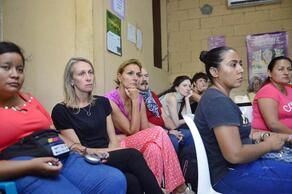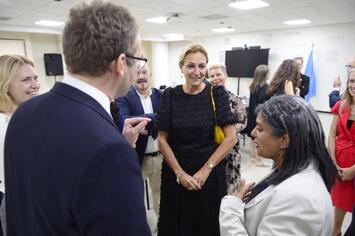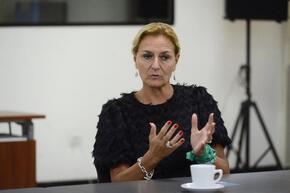What was the trip to El Salvador like, and what have you taken on board?

It was a confronting trip. Especially the fear people have of the regime to speak freely, from healthcare providers and patients to teaching staff. It shows that relational and sexual education is essential. Healthcare providers say they had those tools, and were willing to use them, but the regime took them away. That’s what the international community should be working on, that’s where human rights are being trampled. The right to education, which also means the right to relational and sexual education, has been abolished under the current regime. Gynaecologists say they’re often afraid to help their patients. However the ministry likes to brag, that nobody is left out, and everyone receives a contraceptive plan.
What did you learn about maternal health?
Publicly, they say there’s maternal care, that the girls walking out of the hospital have a contraceptive plan, but if you look at the Atlas of Contraception, you see that only four in ten women have access to contraception. It’s up to healthcare providers to find a solution. Condoms are free, but you have to pick them up at a clinic. This means there are still barriers, and the system has not been sufficiently worked out.
What did you already know, what is the situation in El Salvador like?

I didn't know it was so bad, I run projects in Ecuador myself. I’ve worked on SRHR and people talk about it. Abortion is a right in Ecuador, but contraception and relational and sexual education are still taboo sometimes, especially in Quechua communities. But what’ is different with those projects on relational and sexual education in Ecuador is that they’re talked about openly. The culture of fear in El Salvador was new to me. They keep people in the dark, and the excuse they give is that they still have to work on the programme. You shouldn't be silent about relational and sexual education until it’s finalised, of course. This is something that could be brought out into the open a bit more in our country, this culture of fear and silence that we see in other countries is often not talked about in Belgium.
What was the meeting with the parliamentarians about? How did you experience it? Which topics did you discuss?
The opposition says the debate culture has completely stopped, but they’re still trying to make things happen. They talk to the NGOs (e.g. collectiva feminista) and they really want to move towards change, but all parliamentary debate has stopped. Interestingly, they’re closely following the proceedings before the Inter-American Court of Human Rights. The Beatriz case that will be decided this autumn offers an opportunity. Beatriz was a young pregnant woman with Lupus. Pregnancy is not advisable if you have Lupus. She was pregnant with her second child, which was not viable, and requested an abortion. She’s not allowed an abortion, but after protesting, a caesarean is performed. The baby is stillborn, and Beatriz, very weakened, dies four years later. The case is brought before the Inter-American Court of Human Rights and El Salvador is expected to receive a conviction or at least a reprimand. It would be a good moment for the international community to raise this matter again.
How can we ensure that international cooperation is based on local needs, and did you see any good examples of this? What did you think of the meeting between policymakers and civil society?
I saw and spoke to two very powerful well-organised groups. They know what their rights and opportunities are and are supported by Europe and the UN. I’m convinced that through the network they’re building among the women themselves, they can make a difference. For example, we went to a kind of shelter for women who suffered sexual violence. They have that network, they use it, and I believe in very direct projects, for local people. The international community can keep an eye on this too, albeit discreetly, and provide support, without snubbing the regime. That's also important, that people can seek legal, logistic support, and feel supported.
What insights will you take with you to parliament?

It’s important that we continue to defend women's rights, human rights, sexual and reproductive rights, and that we use all means at our disposal to do so. I think it’s powerful that we were there with members of different parliaments, with completely different political views, and that we’re now going to sign this declaration together. We ask that those rights be respected, and that abortion for medical reasons at least be allowed. But also to reintroduce relational and sexual education for young people. I’ll take this insight to parliament, we have to continue working with organisations that are close to the local population, and at the same time we have to continue pressuring the international community to respect the conventions.

 RSS Feed
RSS Feed